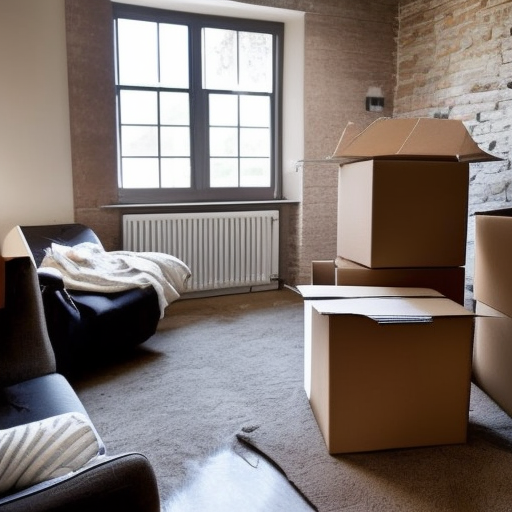This guide aims to provide crucial information on what moving insurance does not cover when relocating to your new home. While moving insurance offers valuable protection for your belongings during transit, it’s crucial to understand its limitations to avoid any surprises.
Knowing what is not covered under your moving insurance can help you make informed decisions to safeguard your assets effectively.

Unforeseen circumstances such as natural disasters, damage from DIY packing, or failure to disclose items of significant value can result in complications when filing a claim with your moving insurance. This guide will shed light on these exclusions, helping you navigate the intricacies of moving insurance.
Stay informed and prepared as you begin on your journey to a new home with a clear understanding of what moving insurance may not protect.
Understanding Moving Insurance
While moving insurance is an important aspect of any relocation process, it’s imperative to understand the different types of coverage available to you. When choosing a moving company, you’ll want to explore the options for insurance to ensure your belongings are protected throughout the moving process.
Types of Moving Insurance
- Released Value Protection: This provides minimal protection based on the weight of your items, not their actual value.
- Full Value Protection: Offers comprehensive coverage for the total value of your possessions, including repair, replacement, or cash settlements.
What Moving Insurance Generally Covers
| Carrier | Covers |
| Standard Cargo Coverage | Damages done to items in transit and sometimes storage. |
| Released Value Protection | Minimal protection based on item weight. |
| Full Value Protection | Total value of lost or damaged possessions, including repair, replacement, or cash settlements. |
| Separate Liability Coverage | Third-party coverage for additional protection beyond basic policies. |
| Not Covered Under Moving Insurance | Damage due to DIY packing and failure to inform movers of valuable items. |
Covers under moving insurance provide a safety net for your items during the moving process. While the policies may vary, having insurance in place gives you peace of mind that your belongings are protected in case of unforeseen events.
Remember to discuss the specifics of your coverage with your moving company to ensure that you have the right level of protection for your move.
Uncovered Territories: What’s Not Protected?
Many individuals rely on moving insurance to safeguard their belongings during a move, but it’s necessary to understand what isn’t covered under typical policies.
While moving insurance provides a level of protection, there are certain items and situations that fall outside its coverage.
Items of Extraordinary Value
Any possessions of extraordinary value, such as fine art, antiques, or jewelry, may not be fully protected by standard moving insurance. It’s crucial to disclose and document these items separately from the rest of your belongings to ensure they receive proper coverage.
Perishables and Pets
To avoid any issues with your moving insurance, it’s important to note that perishable items and pets are typically not covered under standard policies.
If you plan to transport these items, it’s best to make alternate arrangements to ensure their safety during the move.
Additionally, moving companies may not be equipped to handle the care of live animals or perishable goods, making it necessary to address these items separately.
Hazardous Materials
Avoid complications by knowing that hazardous materials are usually excluded from moving insurance coverage.
If you have items such as chemicals, flammable substances, or other dangerous materials, it’s best to handle their transportation or disposal yourself to prevent any potential liabilities.

If hazardous materials are involved in your move, it’s critical to follow proper safety protocols and legal requirements to ensure a smooth transition.
Personal Documents and Currency
Personal documents, important paperwork, or large sums of money are often not covered under standard moving insurance policies. These items hold significant personal value and should be transported separately or by secure means to prevent any loss or damage.
Personal documents and currency should be kept close and accounted for during the moving process to reduce the risk of any potential issues arising.
Factors That Impact Moving Insurance Coverage
Despite moving insurance being a valuable asset to have during a relocation, there are certain factors that can impact the coverage you receive. It’s important to understand these factors to ensure you have adequate protection for your belongings.
Recognizing these factors can help you make informed decisions when choosing a moving insurance policy.
Owner Packed Boxes vs. Mover Packed
Clearly, how your items are packed can affect the coverage provided by moving insurance. If you pack your belongings yourself, you may be responsible for any damages that occur during the move.
However, if the moving company packs your items, they may assume liability for any damages. It’s necessary to clarify this with your moving company to avoid any confusion.
Pre-Existing Damage
Factors such as pre-existing damage to your items can also impact moving insurance coverage. It’s crucial to document the condition of your belongings before the move to ensure that any damages incurred during transit are accurately accounted for.
A comprehensive inventory and photos can assist in providing evidence of the condition of your items.
Awareness of potential pre-existing damage can help you better navigate the claims process and ensure that you receive appropriate compensation for any losses.
Natural Disasters and Acts of God
Now, natural disasters and acts of God, such as earthquakes or floods, may not be covered by standard moving insurance policies. It’s necessary to review the terms of your policy to understand what is excluded. In the event of such catastrophic events, additional insurance coverage may be necessary to protect your belongings.
Mechanical Malfunctions
For mechanical malfunctions that occur during transit, be sure to review your moving insurance policy to determine if such incidents are covered. While rare, mechanical issues with the moving vehicle or equipment can result in damage to your belongings.
Having clear information on your insurance coverage can help you address any potential issues that arise due to mechanical malfunctions.
The Pros and Cons of Opting for Moving Insurance
Your decision to opt for moving insurance can have both advantages and disadvantages. To help you weigh your options, here are the pros and cons of investing in moving insurance:
| Pros | Cons |
|---|---|
| Peace of Mind | Additional Costs |
| Financial Protection | Limited Protection |
Pros: Peace of Mind and Financial Protection
There’s no denying that having moving insurance can provide peace of mind during a stressful time. Knowing that your belongings are covered in case of loss or damage can alleviate some of the anxiety that comes with moving.
Additionally, having financial protection means that if something does go wrong during the move, you won’t be left with a hefty bill to replace or repair your items.
Cons: Additional Costs and Limited Protection
One downside of opting for moving insurance is the additional costs involved. While it may seem like an extra expense, the benefits of coverage can outweigh the upfront investment. However, it’s important to note that even with moving insurance, there may be limitations to what is covered.
Items of high value or specific conditions may not be fully protected under standard insurance policies, requiring additional coverage or careful documentation.

Tips for Maximizing Your Moving Insurance
Unlike standard cargo coverage that typically covers damages done to items in transit, there are ways to maximize your moving insurance to ensure your belongings are fully protected. Here are some tips to help you make the most of your moving insurance:
- Creating accurate inventory lists
- Getting appraisals for high-value items
- Understanding the fine print
- Choosing the right deductible
Creating Accurate Inventory Lists
Anytime you move, it’s crucial to create a detailed inventory list of all your belongings. This list should include items valued at more than €100 per pound and their corresponding values. By having a well-documented inventory, you can ensure that your items are properly covered in case of loss or damage during the move.
Getting Appraisals for High-Value Items
While some moving insurance policies cover high-value items, it’s crucial to get appraisals for these items before the move. It helps to determine their true worth and ensures that you receive adequate compensation in case of damage or loss.
Understanding the Fine Print
High Value Items in moving insurance policies often have specific criteria and limitations that you need to be aware of. For instance, some policies may not cover damage due to natural disasters or failure to inform your movers of certain items.
By carefully reviewing and understanding the fine print, you can make sure that you are fully aware of what is and isn’t covered under your policy.
Choosing the Right Deductible
Appraisals for choosing the right deductible to have can make a big difference in how much you pay out of pocket in case of a claim. Items like electronics or jewelry may require a lower deductible to ensure adequate coverage. By assessing your items’ value and the potential risks involved in the move, you can choose a deductible that fits your needs.
Step-by-Step Guide to Getting Moving Insurance
Assessing Your Need for Insurance
Not sure if you need moving insurance? Assessing your need for insurance is the first step in ensuring your belongings are protected during your move. Consider the value of your possessions and the risks involved in the moving process.
| Step 1: Evaluate the value of your belongings | Step 2: Assess the potential risks during your move |
Researching and Comparing Insurance Options
Any decision to purchase moving insurance should be well-informed. Researching and comparing insurance options will help you find the coverage that best suits your needs and budget.
| Step 1: Research different types of moving insurance policies | Step 2: Compare coverage options and pricing from various insurance providers |
Getting multiple quotes and reading customer reviews can help you make an informed decision on which insurance policy to choose.
Preparing Necessary Documentation
Your ability to make a successful insurance claim often relies on the documentation you provide. Before purchasing a policy, make sure you have all the necessary documentation ready.
| Step 1: Document an inventory of your valuable items | Step 2: Gather any receipts, appraisals, or proof of value for high-ticket items |
With detailed documentation, you’ll be better prepared to file a claim in case of loss or damage during your move.

Finalizing and Purchasing Your Policy
If you’ve done your research and collected the necessary documentation, it’s time to finalize and purchase your insurance policy. If you want to ensure your belongings are protected for the duration of your move, choosing the right policy is crucial.
Policy options like full value protection give you comprehensive coverage, while released value protection offers basic protection based on weight. Choose the policy that best meets your needs and budget to ensure a smooth and worry-free move.
Conclusion
It is necessary to understand that moving insurance may not protect against certain circumstances. It is crucial to inform your movers of any perishables or hazardous materials, avoid DIY packing which can lead to damages, and ensure that items of significant value are explicitly mentioned to your movers in writing.
If you are unsure about whether moving insurance is right for you, Dublin Removals’ experts are available to provide guidance and answer any questions you may have. Moving insurance can provide peace of mind during a move, especially for long-distance or challenging relocations.
Contact Dublin Removals today at 085 8327676 or reach out online for more information on how to protect your assets during your upcoming move.
